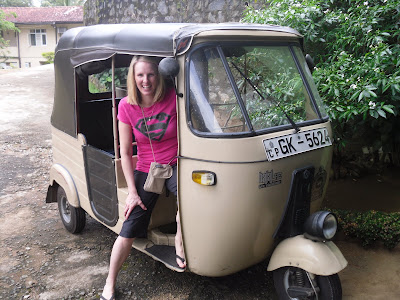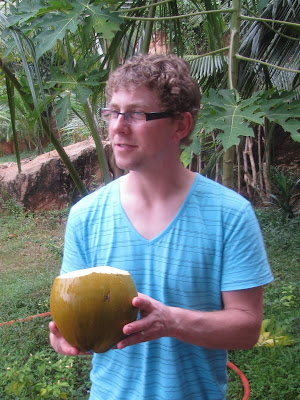I have a theory that the world is filled with, for lack of a better word, a 'magic' that is all around us, masqueraded in the mundane. I'm not talking magic like sorcery and mysticism, but more a sense of wonderment that we only experience when we allow ourselves to be aware of it. It's nothing fancy or expensive and it rarely announces itself and yet it displays itself every day, right under our very noses. Allow me to illustrate by explaining the 'thong theory'.
First of all, let me be clear that in the Aussie vernacular, 'thong' refers to an item of footwear, not an article of ladies underwear. A significant difference, it is true, so for readers of other nationalities it might be appropriate to read 'slipper' or 'flip-flop' in place of the word 'thong'. Now that we are on the same page, I shall continue. Imagine, if you will, a single thong, marked with the grubby outline of a foot; it is probably old, perhaps even battered. Following the pattern of one of life's phenomena, it finds itself awash at sea. It's origin is unknown; perhaps it has been discarded, perhaps the tides stole it from an evening fisherman. How it got there, however, hardly seems an issue because it's just a thong. It's not an expensive runner or a chic heel; it doesn't even belong to someone's favourite pair of comfortable shoes. When its absence is noticed, if it is even noticed at all, it will probably be replaced without a second thought. It is just an insignificant piece of footwear being tossed about on the vast expanse of the ocean.
Now imagine the journey of this insignificant piece of discarded rubber. It floats over coral reefs, alive with fish of all colours, shapes and sizes. It floats past amazingly oversized whales, a bare speck in comparison. It floats alone in the deepest parts of the ocean, where even few vessels would dare to travel. It experiences the storms of the deeps; is thrown by waves that would inspire fearful awe. It is pushed by gentle breezes over calmer waters. Sharks swim silently beneath and it is unafraid. Dolphins leap playfully about it. It is carried through waters of every hue of blue and green. It allows the waters to push it forwards as, all around, mother tortoises are making their remarkable journey towards the moonlit shores to bury their treasured eggs in the sand. As the light of the rising sun sweeps over the land, the thong is found resting on sands never imprinted by the feet of humans, on a postcard-perfect beach.
In a most unspectacular manner, the thong has undertaken a most spectacular journey and nobody has noticed. It has been where most of us would pay good money to holiday. It has been within touching distance of some of the wonders of nature. It has been to places that most of us will only ever experience from the other side of a television screen. It has faced danger with the courage of a hero and yet will never be given a medal. It has travelled the oceans like a solo yachtsman and yet we will never see its photo in the paper; no ticker tape thrown as it finally reaches shore. Like a great explorer, it has gone where no man has gone before and yet it will not plant a flag and will never have its name recorded in any recount of history. This is the magic of the mundane that many of us miss.
If I were a sci-fi enthusiast I might be able to speak in greater detail about the theories of parallel universes; this idea that there might be innumerable existences for each of us, played out trans-dimensionally. Each of these different worlds play out simultaneously - same actors, different plays - with each world unaware of the existence of the others. Parallel universes aside, perhaps the sci-fi enthusiasts are onto something. Planet Earth is a web of innumerable worlds, soaked in the magic of the mundane. Each world, the story of a connection of people, unfolding in real time, the spectacular wrapped in the unspectacular. Stranger than fiction, truer than a movie, more tangible than live theatre. And the beauty of it? You can write the storyline; you can help develop the characters; you can step on the stage. The magic of the mundane is accessible to anybody and at any time you might suddenly feel it bursting upon you.
Yesterday I was delightfully visited by the magic of the mundane. Like an old thong floating through the ocean (perhaps a scarily appropriate simile), I was privileged to be a front-row spectator to one of life's simple but beautiful stories and to feel the honour of knowing that I was getting to be part of something that most will probably never experience. It was nothing spectacular - in fact, it was an English class. I had gone to visit a friend as she taught an English class to four pre-school teachers. Because she had asked for feedback and advice, I had put myself inconspicuously in the corner of the room so that I could observe without distracting her students.
In the heat of the afternoon, the fan turning faithfully above our heads created a pleasant breeze. In the next room, around 40 pre-schoolers lay in two neat rows on a woven floor mat, napping under the supervision of two of the school's helpers while their teachers became the pupils for an hour. Just outside the door, a small, black dog also enjoyed a mid-afternoon doze. In the custom of Sri Lankan hospitality, one of the ladies bought me tea, a sweet brew with tea leaves that had escaped the strainer sitting in the bottom of the cup and the recognisable flavour of powdered milk. This is the tea that, for some reason, reminds me of my nana and the teacups she used when I was a child and that I realise I now think of as 'real tea'.
So I sit under the gentle beat of the fan, drinking my 'real tea' and watching the young ladies at the table and the young lady who is teaching them. As this is a beginner class, there is a lot of Sinhala spoken, punctuated by the familiarity of English. The students seem to have learnt their early lessons well and, although they seem a little anxious about possibly making mistakes while I'm in the room, they also seem to be thoroughly enjoying their lessons. The young lady furthest from me seems to have had some previous exposure to the English language and comes across as the most confident. She is thoroughly amused when she confuses the words 'horse' and 'house'. The second student seems to be the least confident, compensating with all sorts of jokes and merriment. I wonder if she realises how difficult a task learning a new language is, and how very well she is doing. The third student enjoys the speaking and listening tasks and I am impressed by her command of expression in her voice.
The student closest to me is the quietest. She is not distracted by the merriment around her. She quickly and competently finishes her work so that the teacher may mark it while the others are still writing. I know that she is the sister of the second student and I contemplate the marked difference between the two. One is surprisingly tall for a Sri Lankan, while the other is pocket-sized. One has talked and laughed without ceasing throughout the class, while the other has not spoken an unnecessary word. One approaches her learning with humour, the other with quiet dedication. There is something comfortable in these observations; an awareness that even in different worlds there are common elements -familiar personalities, familiar relationships that connect them, familiar similarities and differences between us. And bringing them all together, the teacher, patiently instructing them and creating opportunities for them to realise their success. I am impressed by her teaching skills; she leads them confidently and has a lovely disposition that makes her students at ease.
I know I risk boring you with a rather mundane description of four students and their teacher but I'm wondering if my words allow you to see through the description to what I actually had the privilege of witnessing. I got to experience the magic of the mundane. None of the other ladies in that room would have thought there was anything spectacular about that class - not the room, not the tea, not the fan or sleeping dog or children. For them, it was all quite normal. But I got to enjoy the magic of another world, quite different to what I am used to. I got to see the story of five women unfolding before me - to bear witness to their joy and to their friendship. I had the honour of knowing that this was a story that I have been able to be a small part of and I know that this is a story that will tie into the stories of the children sleeping in the next room and the two women caring for them. These stories will continue to grow out from there, growing and spreading into an intricate network of stories. And that, my friends, is the thong theory at work - recognising the magic of the mundane and being part of the spectacular unspectacular.






























